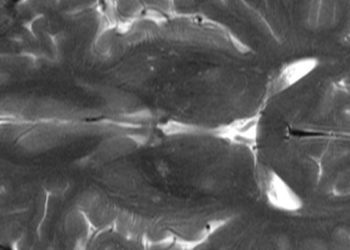Brigatinib decreases the size of NF2-related progressive tumors
1. In this randomized controlled trial, brigatinib reduced the size of progressively growing tumors in patients with neurofibromatosis type 2-related schwannomatosis (NF2-SWN).
2. In participants receiving brigatinib, hearing improvement occurred in some patients according to the audiologic testing, while pain severity decreased according to self-reported data.
Evidence Rating Level: 1 (Excellent)
Study Rundown: NF2-SWN is a tumor-suppressor syndrome that predisposes individuals to developing schwannomas, meningiomas, and ependymomas. The cause of NF2-SWN is a set of pathogenic variants in the moesin-ezrin-radixin-like tumor suppressor gene (NF2). Treatment options include surgery, the standard of care, and chemotherapy. The Innovative Trial for Understanding the Impact of Targeted Therapies in NF2 (INTUITT-NF2) was designed as a phase two trial using a basket design, addressing challenges in therapeutic options for NF2-SWN. The patients were given 90 mg oral brigatinib daily for seven days; then, the dose was increased to 180 mg daily if no toxic adverse events occurred. An objective radiographic response of target tumors was assessed to understand the effectiveness of brigatinib as a treatment for progressive NF2-SWN tumors. Response for all tumors, time until tumor progression, hearing acuity improvements, and changes in NF2-specific quality of life were assessed as further effects of the study. Some limitations of the trial include the lack of a placebo control due to the low occurrence of NF2-SWN, as well as the inclusion of patients with cancerous tumors. In summary, treating progressive tumors in patients with NF2-SWN with brigatinib was an effective and safe way to shrink multiple tumor types. It was associated with better hearing and lower amounts of pain.
Click here to read the study in NEJM
In-Depth [randomized controlled trial]: This phase 2 trial enrolled patients under 12 years of age with a confirmed diagnosis of NF2-SWN, along with the radiographic progression of an NF2-related tumor in the past 36 months. If the patient had more than one eligible tumor, the physicians chose the tumor most needed for treatment. On the other hand, patients were excluded from the trial if they were actively receiving chemotherapy, had received radiation to the target tumor in the past 36 months, or had target tumors that were not responsive to volumetric magnetic resonance imaging (MRI). Between June 2020 and June 2022, 40 participants (median age, 26 years) were enrolled at six different sites. From stage one of the study, 20 participants were enrolled across the four tumor baskets, while an additional 20 patients were enrolled into the nonvestibular schwannoma and meningioma baskets in stage two. Of the patients, 10 had vestibular schwannomas, eight had nonvestibular schwannomas, 20 had meningiomas, and two had ependymomas. A total of 10% of targeted tumors showed a response (95% Confidence Interval [CI], 3 to 24) after follow-up approximately 10 months later, specifically 0 of the 10 vestibular schwannomas, 1 of 8 nonvestibular schwannomas, 3 of 20 meningiomas and 0 of 2 ependymomas. The total radiographic response for all tumors was 23% (95% CI, 16 to 30), with meningiomas and nonvestibular schwannomas benefitting the most. From before starting treatment to during treatment, the mean annualized growth rate decreased from 65% (95% CI, 25 to 106) to 8% (95% CI, -1 to 17) respectively. Many patients experienced improvements in hearing intelligibility (13 of 37 ears; 35%; 95% CI, 20 to 53) and hearing sensitivity (10 of 44 ears; 23%; 95% CI, 11 to 38). The severity of pain, assessed from self-reporting, decreased over the time that treatment was given (-0.013 units per month; 95% CI, -0.002 to -0.029). Overall, brigatinib was associated with a decrease in tumor size in NF2-SWN.
Image: PD
©2024 2 Minute Medicine, Inc. All rights reserved. No works may be reproduced without expressed written consent from 2 Minute Medicine, Inc. Inquire about licensing here. No article should be construed as medical advice and is not intended as such by the authors or by 2 Minute Medicine, Inc.









